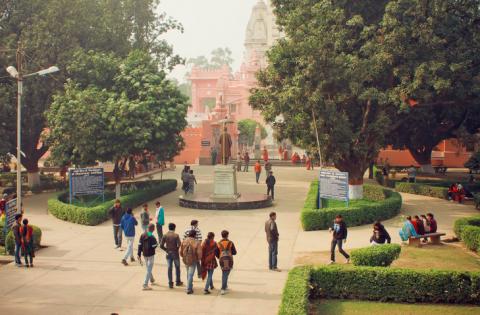A country thousands of years old with rich culture, religious diversity and hundreds of languages, India is a great destination for international students. India is also home to an ancient education system and one of the oldest universities in the world, Nalanda University, which was founded in the 5th century and was revived in 2010.
Today, India has more than 800 universities spread across the land. Many have a high global reputation and are known for training students to join multinational companies.
1. Where to begin
Developed from the British educational system, India has a centralised agency, the University Grants Commission (UGC), that regulates university education. Technical and professional education is controlled by the All India Council for Technical Education (AICTE), and medical education by the Medical Council of India. Be sure to find out if your university of choice is recognised by one of these agencies before you apply.
It’s best to avoid institutions without any affiliation with the central agencies because there may be a risk that your degree will not be recognised by your home country when you return.
The National Assessment and Accreditation Council, an autonomous body of the UGC, and the National Institutional Ranking Framework of the Ministry of Human Resource Development both look after quality assurance and evaluate higher education institutions.
2. Types of universities
India has four major types of university: central universities (managed by the government of India); state universities; private universities (regulated by the UGC and local state statutes); and religious minorities institutions, run by trusts of their respective communities.
One can opt for any kind of institution that accepts international students and is recognised globally. Generally, the institutions run by the central government are the best for international students as they may offer scholarships and have a high quality of education.
Private universities are also playing a big role in offering education to foreigners, thanks to their flexibility and less bureaucratic approach.
Find out more about the best universities in India here.
3. Major destinations
Educational institutions are spread across the country; however, international students might find the more suitable locations to be the bigger cities such as New Delhi, Pune, Mumbai, Hyderabad, Kolkata, Bengaluru and the like.
Pune and Bengaluru, in particular, have emerged as popular destinations for international students because of their temperate climate, metropolitan culture, good presence of foreigners and quality education.
4. Campus culture
Most of the good universities have a vibrant campus culture and amenities such as cafeterias, hostels, mini-markets and even basic health facilities. Some even have international hostels, which are very useful in confirming the presence of other international students.
Indian universities are also known for their beautiful campuses, among them Banaras Hindu University, located in the historic city of Varanasi, and Jawarharlal Nehru University, located in the heart of New Delhi.
5. Where to stay
Generally, the international hostels, if available, are the best places for international students because they offer not only complete safety inside the campus bus also a wide network of friends and a good atmosphere for learning. However, the shared residential apartments near the campuses are quite popular among foreign students in India and can be searched online or through the international office of the universities.
6. Travel
As India is such a huge country, it is important to figure out how you’re going to get about. Almost all big cities have airports and are well connected through the widespread Indian Rail network. One can easily book flights and train tickets online. The cities generally have inter- and intra-state bus stations, where tickets can be bought over the counter, and in some cases online as well.
A bicycle is a good way to get around your university campus. However, many students have motorbikes and also use the free shuttle services available on larger campuses such as the Jawaharlal Nehru University and many others.
7. Food
Indian food is known all over the world to be delicious and flavourful, so be sure to try as much local food as you can. Almost every corner of the country has its own cuisine, which is worth exploring.
Many Western chain restaurants are present across the country, often adding an Indian touch to their dishes, which makes them spicier and can take some getting used to. And there are, of course, innumerable great traditional restaurants to be found everywhere.
8. Language
Almost all premier institutions in the country offer courses just in English. The technical, medical and professional education is offered almost exclusively in English and follows a uniform syllabus across the country.
Because of the country’s linguistic diversity, English has also become a common language among students. Outside campuses, the local tongue dominates, so this could be an opportunity to learn a new language.
9. Paperwork
Be prepared to face a lot of forms and letters when you first come to university in India. Indians love paperwork, so be ready with multiple photocopies of your documents and certificates. Digitisation is being embraced rapidly in the education system, but there is a long way to go.
Do not expect to be able to address and resolve everything by email or an online portal. It is better to approach the administration offices for things such as admission, registration, examinations, results or any official requirement and stay on top of paperwork deadlines.
10. Scholarships
The most important part of international education is financing. International students can get a quality education at a fraction of the cost compared with other countries.
The Indian Council for Cultural Relations offers a number of scholarships to low-income students. Recently, the Ministry of Human Resource Development has been offering fee waivers at thousands of education institutions through its Study in India initiative. This portal is a good place to visit if you are interested in studying in India.

Comments